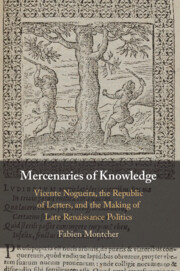
-
Select format
-
- Publisher:
- Cambridge University Press
- Publication date:
- September 2023
- September 2023
- ISBN:
- 9781009340458
- 9781009340496
- 9781009340489
- Dimensions:
- (229 x 152 mm)
- Weight & Pages:
- 0.64kg, 346 Pages
- Dimensions:
- (229 x 152 mm)
- Weight & Pages:
- 0.501kg, 346 Pages
You may already have access via personal or institutional login
Book description
From Lisbon to Rome via the Gulf of Guinea and the sugar mills of northern Brazil, this book explores the strategies and practices that displaced scholars cultivated to navigate the murky waters of late Renaissance politics. By tracing the life of the Portuguese jurist-scholar Vicente Nogueira (1586–1654) across diverse social, cultural, and pol-itical spaces, Fabien Montcher reveals a world of religious conflicts and imperial rivalries. Here, European agents developed the practice of 'bibliopolitics'– using local and international systems for buying and selling books and manuscripts to foster political communication and debate, and ultimately to negotiate their survival. Bibliopolitics fostered the advent of a generation of 'mercenaries of knowledge' whose stories constitute a key part of seventeenth-century social and cultural history. This book also demonstrates their crucial role in creating an inter-national and dynamic Republic of Letters with others who helped shape early modern intellectual and political worlds.
Reviews
‘In this fascinating and exhaustively researched study of the 'republic of letters' in the seventeenth century, Fabian Montcher examines the life of Vicente Nogueira (1586–1654), a highly educated but mostly unpublished Luso-Hispanic bureaucrat, intellectual, book editor, and eventually book buyer and library advisor … Montcher’s careful reconstruction of Nogueira’s life and importance is built on an impressive body of archival as well as printed primary sources and an extensive examination of secondary sources pertaining to Nogueira’s many correspondents.’
Stuart B. Schwartz Source: Journal of Modern History
Contents
Metrics
Altmetric attention score
Full text views
Full text views help Loading metrics...
Loading metrics...
* Views captured on Cambridge Core between #date#. This data will be updated every 24 hours.
Usage data cannot currently be displayed.
Accessibility standard: Unknown
Why this information is here
This section outlines the accessibility features of this content - including support for screen readers, full keyboard navigation and high-contrast display options. This may not be relevant for you.
Accessibility Information
Accessibility compliance for the PDF of this book is currently unknown and may be updated in the future.

